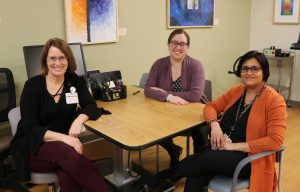The National Eye Institute (NEI) recognizes February as Low Vision Awareness Month, a time to raise awareness about people with vision impairment, their family, friends, and caregivers. According to the NEI, more than 3 million Americans have a vision impairment affecting activities of daily living that cannot be corrected with glasses, contact lenses, procedures, or surgery.
The UW Department of Ophthalmology and Visual Sciences remains on the forefront of conducting research and providing interventions and strategies – such as adaptations and aids –that help these individuals live independently with their remaining functional vision.
“Low Vision Awareness Month is the ideal opportunity to spread the word about vision rehabilitation – and make sure that people with vision impairment know about services available to them,” said Sanbrita Mondal, OD, chief of Vision Rehabilitation Services.
Vision Rehabilitation Services provides patients with services in low vision optometry, occupational therapy, and social work – in a multidisciplinary coordinated, unified setting.
Social worker Alicia Wolf joined the team in 2018. “Alicia provides patients with vital information about available resources, including transportation services, connections with the local agencies, as well as addressing food, financial, and housing concerns,” said Mondal. Wolf also actively addresses mental health issues that can arise with vision loss such as anxiety and depression. Addressing mental health plays a key role in successful vision rehabilitation.
The newest member of the team is Mary Ann Roelke. As an occupational therapist, Roelke works with patients to address their goals with vision rehabilitation, training on adaptations to activities of daily living, train on the use of low vision aids and help them develop the skills needed to maintain independent living.

“Occupational therapy is an important part of restoring or improving a person’s everyday life skills,” said Mondal. “This includes basic tasks – like brushing teeth and combing hair – to more complex tasks such as cooking or utilizing a digital device.”
The Vision Rehabilitation Center includes a fully functioning rehabilitation room equipped with a kitchenette, driver’s assessment station, video magnifiers and other tools to support the new occupational therapy services.
“Occupational therapy encompasses so much more than people think,” Mondal said. “In addition to educating people on how to more safely complete daily activities, we can recommend modifications for vocation or in the home, as well as evaluate appropriate low vision devices and provide training.” Therapy sessions are tailored towards the patients needs and visual goals.
Occupational therapy also teaches strategies to compensate for loss of visual field, diminished depth perception, and decreased contrast and color sensitivity, Mondal said.
“It’s often surprising the impact appropriate lighting can make for people with visual impairments -or how a magnifying device can allow them to read a book again.”
Vision Rehabilitation Services are located in the UW Health University Station Eye Clinic. A formal open house is being planned for later this year.